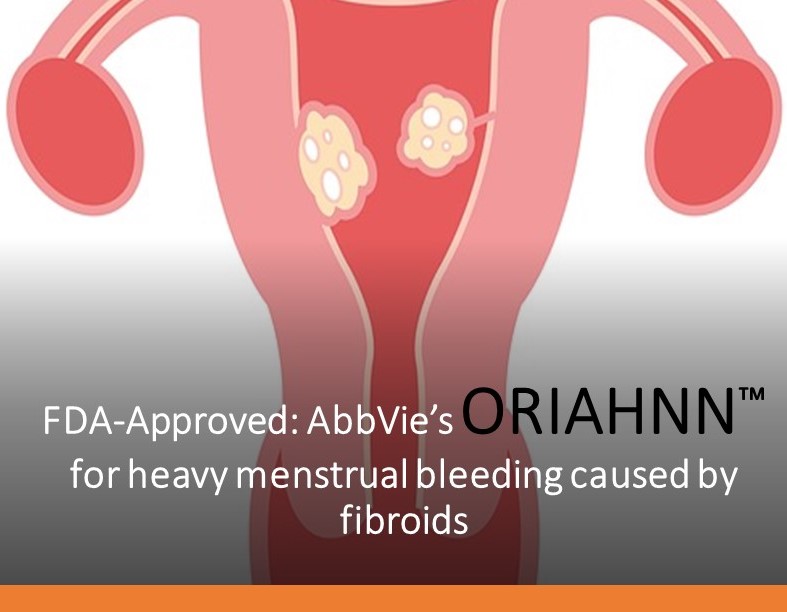[FDA News Release, May 29, 2020] – The U.S. Food and Drug Administration today granted approval to ORIAHNN™ (an estrogen and progestin combination product consisting of elagolix, estradiol and norethindrone acetate) capsules, co-packaged for oral use, for the management of heavy menstrual bleeding associated with uterine leiomyomas (fibroids) in premenopausal women.
Oriahnn is the first FDA-approved non-surgical, oral medication option for the management of heavy menstrual bleeding associated with uterine fibroids in pre-menopausal women
Uterine fibroids, also called leiomyomas, are estrogen and progesterone-dependent non-cancerous tumors of the uterus and are the most common type of benign tumor in women of reproductive age, affecting up to 70 percent of Caucasian women and up to 80 percent of African American women by age 50. Fibroids can cause heavy menstrual bleeding, pain, bowel or bladder problems and infertility; some women may not experience any symptoms. They typically resolve after menopause but are a leading reason for hysterectomy (surgical removal of the uterus) in the United States when they cause severe symptoms.
Oriahnn may cause bone loss over time, and the loss in some women may not be completely recovered after stopping treatment. Because bone loss may increase the risk for fractures, women should not take Oriahnn for more than 24 months. Health care professionals may recommend a bone density scan (called DXA scan) when starting women on Oriahnn and periodically while on treatment.
The most common side effects of Oriahnn were hot flushes (sudden feelings of warmth), headache, fatigue and irregular vaginal bleeding. The drug label for Oriahnn includes a Boxed Warning about the risk of vascular events (strokes) and thrombotic or thromboembolic disorders (blood clots), especially in women at increased risk for these events. Patients should stop Oriahnn if a blood clot, heart attack or stroke occurs. Oriahnn is contraindicated (not to be used under any circumstance) in women with a history of or current blood clots and in women at increased risk for blood clots, including women over 35 years of age who smoke or women with uncontrolled hypertension. Other contraindications include known osteoporosis, a history of or current breast cancer or other hormonally sensitive cancer, liver disease or undiagnosed abnormal uterine bleeding.
Oriahnn does not prevent pregnancy. Women should use non-hormonal contraception during treatment and for one week after discontinuing the medication. Oriahnn may delay the detection of a pregnancy because it changes menstrual bleeding patterns. Oriahnn may increase blood pressure, which should be monitored in women with controlled hypertension during treatment with Oriahnn. Patients should be advised on signs and symptoms of liver injury. Patients are advised to seek medical attention if they experience suicidal ideation or behavior, new onset or worsening depression, anxiety or other mood changes. Patients taking Oriahnn may experience hair loss (alopecia). There is a risk of allergic reaction with Oriahnn because its inactive ingredient, FD&C Yellow No. 5 (tartrazine) may cause allergic-type reactions (including bronchial asthma) in some women.

